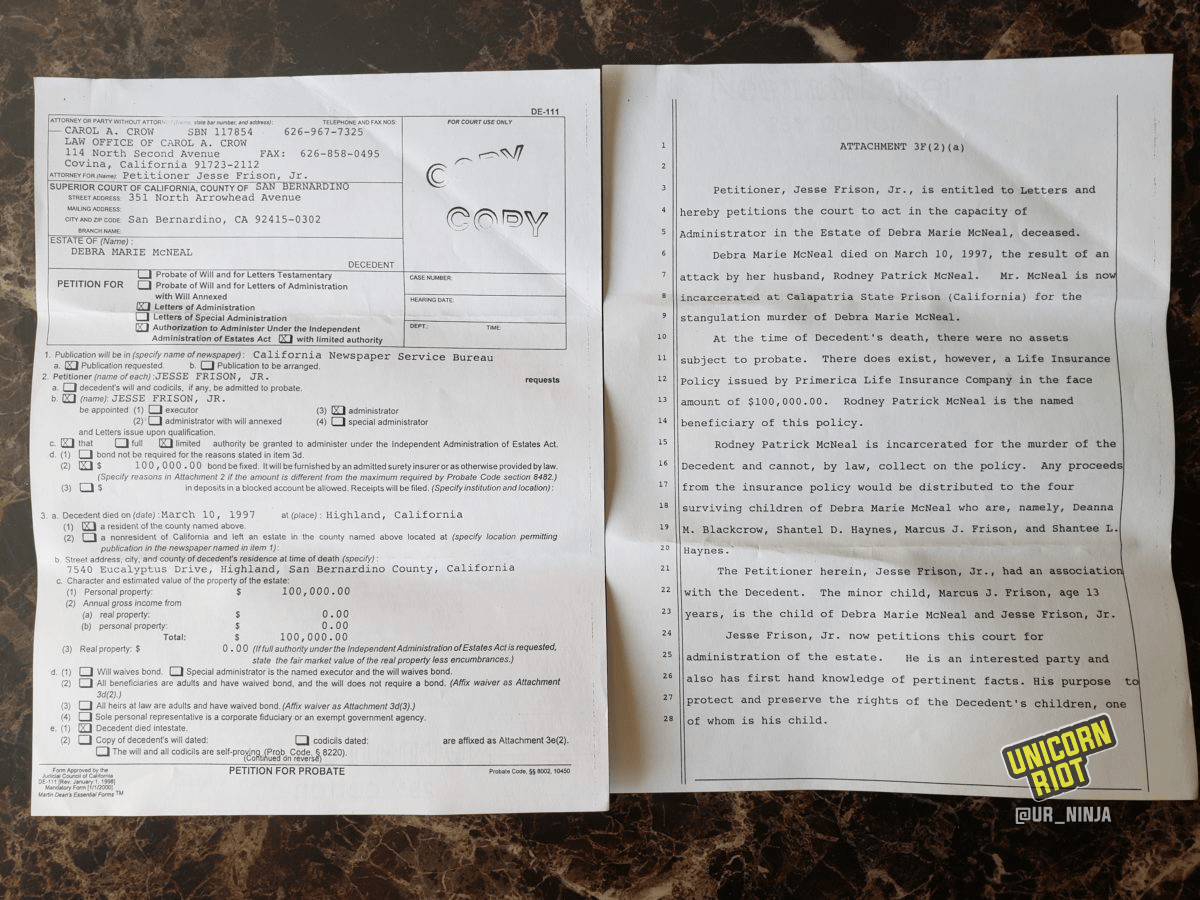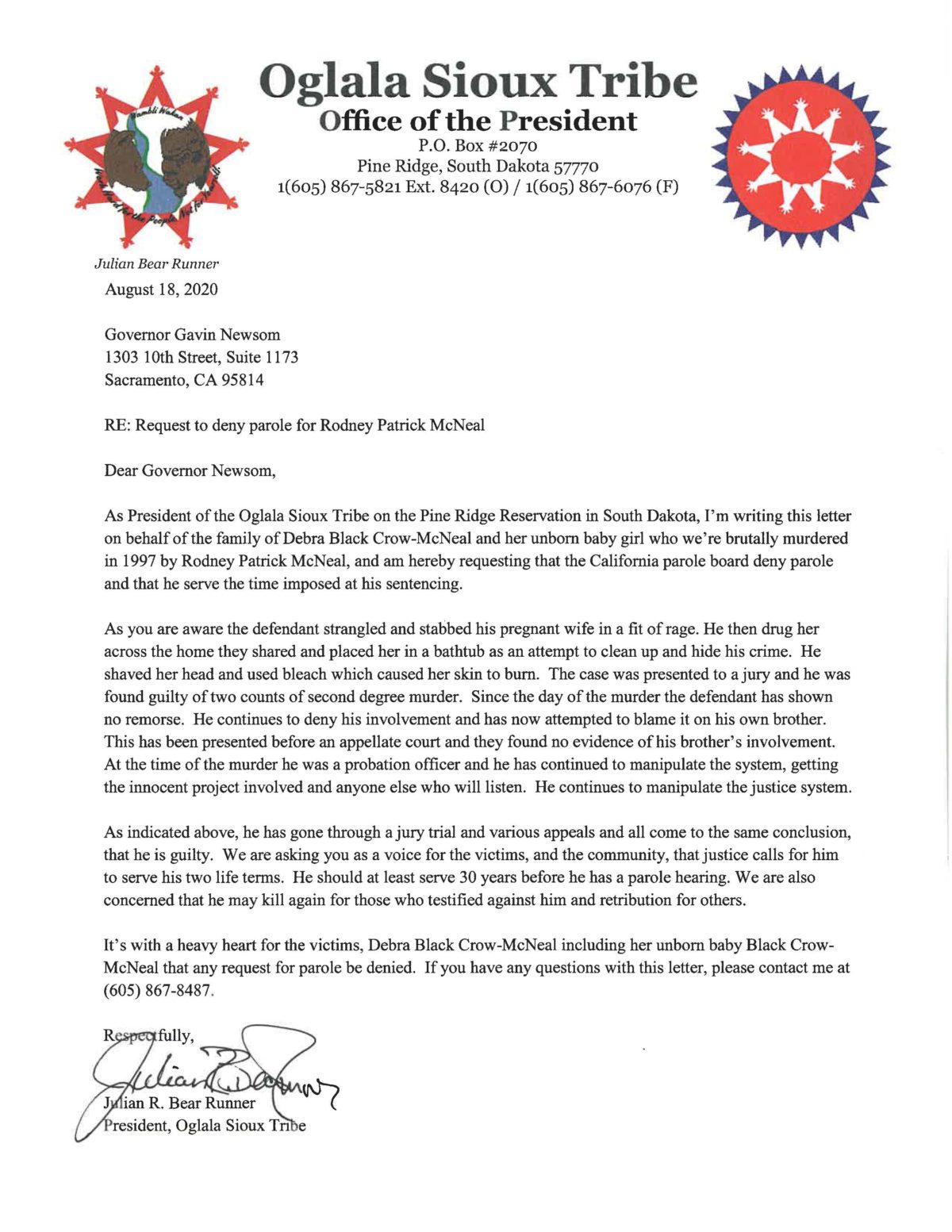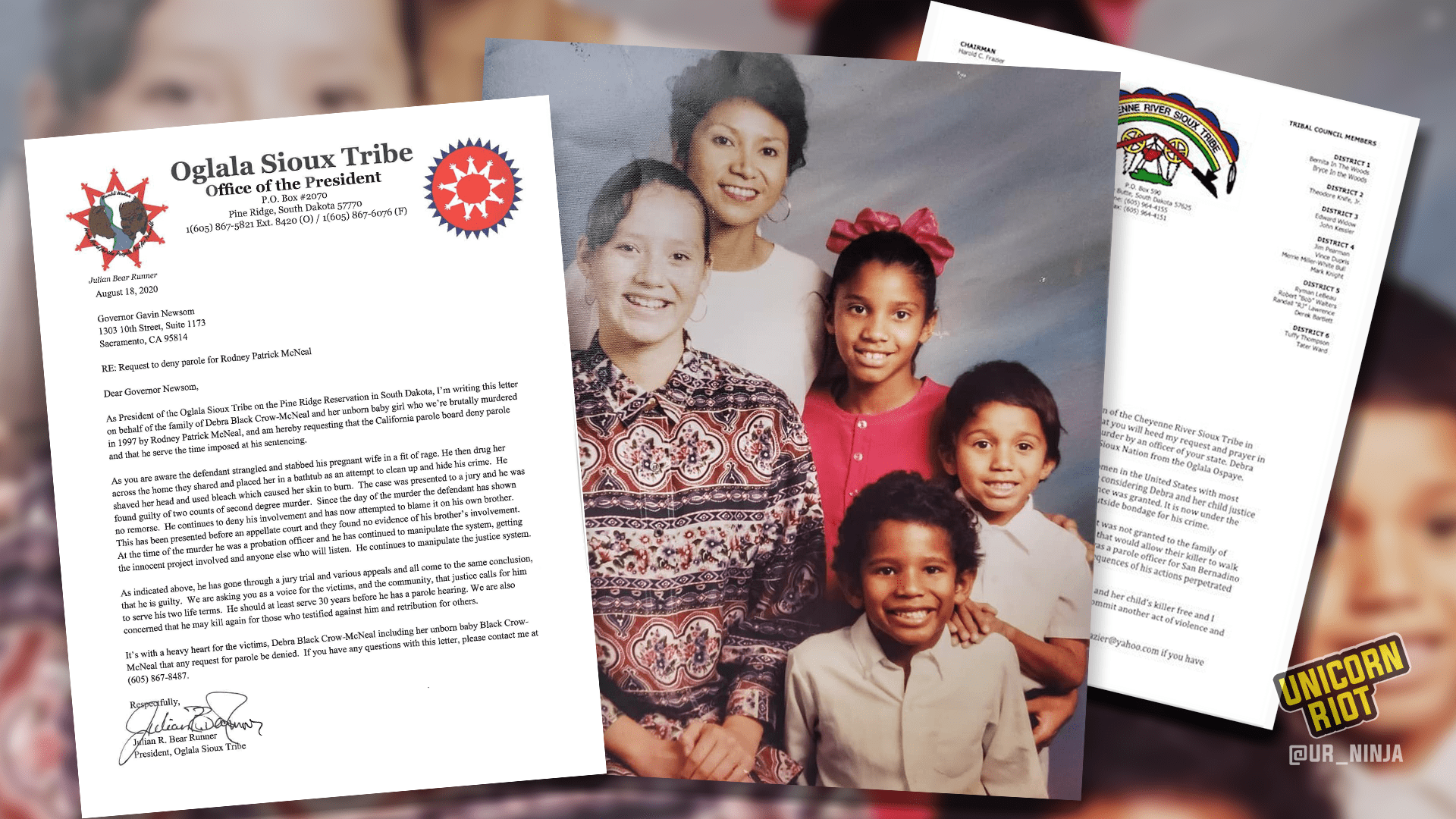Former Probation Officer Convicted of Double Murder Commuted by California Gov., Granted Parole
Sacramento, CA – On Tuesday, October 20, the State of California granted parole to Rodney “Patrick” McNeal, who had been sentenced to 30-years-to-life on May 3, 2000, for the 1997 murder of his wife and unborn child. He was suspected for the brutal killing of his six-month pregnant wife on March 10, 1997, and was later tried and convicted in San Bernardino County for two counts of second-degree murder.
His ex-wife was Debra Black Crow, an enrolled member of the Oglala Sioux Tribe in South Dakota. Her four children from a previous marriage survived their mother. Though her official cause of death was strangulation, her body was discovered with 13 stab wounds in a bathtub along with cleaning agents. Less than two years after Debra first met Rodney “Patrick” McNeal, he would be a key suspect in her violent death.
Patrick McNeal worked as a probation officer in San Bernardino County until his arrested for the murder of his wife. He had a bachelor’s degree in criminal law, and he knew the criminal justice system inside and out from years of experience.
McNeal’s defense was that there wasn’t an opportunity for him to have killed Black Crow. He was documented in his office at 12:15 p.m., and it takes 8 minutes to drive from his workplace in downtown San Bernardino to his home in Highland. McNeal called the police at 12:29 p.m., which would have left only about five minutes unaccounted for. Though McNeal has maintained his innocence, a witness has since testified that they saw him at his home around 12:15 p.m. that afternoon.
Days after Black Crow was found murdered, McNeal filed a $100,000 life insurance claim, claiming to be her sole beneficiary even though she had four children. Because the timing of the insurance claim was so soon after Black Crow’s death, it alerted the insurance company as well as law enforcement that there might be something suspect about McNeal.
Early reports in the investigation revealed that Patrick and Debra Black Crow-McNeal went through multiple domestic disturbance incidents in the months prior to Black Crow’s killing. Although records indicate no arrests were made, firearms were confiscated by police. Records also reveal that Black Crow previously filed an injunction, which was denied.
According to the California Innocence Project, McNeal’s conviction was largely based on the couple’s history of domestic strife; they believe he was wrongly targeted because of his race.
Liquid Pictures, a company that supported the California Innocence Project’s efforts to exonerate McNeal, states on its website, “Liquid Pictures is actively working with the California Innocence Project (CIP), developing pro bono videos to help exonerate Rodney Patrick McNeal, who has been wrongfully imprisoned for over 17 years.”
The company states on behalf of the California Innocence Project that “Patrick is a black man and his wife was a white woman, so when the police arrived and found Patrick at the scene of the crime they assumed his guilt.” They produced four videos with the goal of helping to exonerate McNeal.
According to Black Crow’s daughter Shantel, these statements are false. “Us siblings were exposed to the domestic violence towards our mother from the ages of 6 to 15,” said Shantel Haynes, daughter of Debra Black Crow, in an interview with Unicorn Riot contributor Darren Thompson.
“He isolated my mother to the point of not having fuel in her vehicle, which was why he came to the house that day, so she could have a ride to an appointment. There was really nothing we could do and we felt helpless.”
Shantel Haynes, Debra Black Crow’s daughter
“I didn’t know how to prepare for the California Innocent Project slandering my mother’s name and information,” said Shantel. “They still haven’t taken accountability because she’s dead.”
The slander Shantel refers to is her mother’s wrongful classification by the California Innocence Project as a white woman. She sees this as an effort to portray Patrick McNeal as a victim of the racist criminal justice system.
“They are trying to change the narrative, by saying that a Black man was unjustly convicted by the criminal justice system,” said Shantel. “It is extremely frustrating.”
Several years into his sentence, in 2004, his case captured the attention of the California Innocence Project (CIP). The org has three missions: free the wrongfully-convicted from prison, work to reform the criminal justice system, and train law students to become zealous advocates. They have freed 34 people since 1999.
The California Innocence Project filed a writ of habeas corpus on behalf of McNeal in 2006. Habeas corpus provides a separate avenue for challenging imprisonment. It often serves as a last resort for inmates who insist that a miscarriage of justice has occurred, and is usually accompanied with evidence unavailable at the time of trial.
In their filing on behalf of Mr. McNeal, the California Innocence Project claimed a third party was behind Debra Black Crow’s murder. Former San Bernardino County District Attorney Michael Ramos says otherwise.
“Rodney McNeal initially tried to blame the murder of his ex-wife on her best friend, Terrylynn Youpele,” said former San Bernardino County District Attorney Michael Ramos in a phone call about the case. Afterwards, he blamed his brother, Jeffery West. “He fabricated a third-party years later because he’s already in prison for a double-homicide,” added Ramos, suggesting that McNeal may have invented alternate narratives in order to free himself.
According to the CIP, Patrick McNeal’s half-brother, Jeff West, was already serving time for other killings and admitted to several witnesses he murdered Debra Black Crow-McNeal. However, at an evidentiary hearing in front of a San Bernardino Superior Court judge, Jeff West pleaded the 5th. Thereafter the court ruled that the State of California had a lawful basis for imprisoning Rodney Patrick McNeal.
According to the California Innocence Project’s website, “despite strong evidence that McNeal is innocent, the San Bernardino Superior Court judge declined to reverse McNeal’s conviction.” In McNeal’s case, the evidence in question is the five or so minutes of unaccounted time before he placed the call to the police.
In 2013, the California Innocence Project reviewed all of their cases and identified 12 that varied in convictions, sentencing, and series of events, yet shared one common thread: a legal dead-end in their fight for freedom, as well as what the CIP considers overwhelming evidence of factual innocence. McNeal’s case became politicized as one of the CIP’s original “California 12”.
In 2013, three CIP attorneys embarked on a 712-mile walk from San Diego to Sacramento to raise awareness about the California 12 and wrongful convictions. At the end, they delivered clemency petitions to Governor Jerry Brown asking for the California 12’s freedom; after all were denied in 2015, they filed a petition for commutation instead.
On March 27, 2020, California Governor Gavin Newsom commuted the sentence of Rodney Patrick McNeil from 30-years-to-life to 22-years-to-life. His commutation meant he was now eligible for parole.
“I can’t believe Governor Newsom allowed this case to be commuted, especially when the family was not contacted.”
Shantel Haynes, Debra Black Crow’s daughter
Black Crow’s family continued to hear secondhand about the developments of the case, and were never informed by the Governor’s office that Mr. McNeal’s case was being considered for commutation. It was only two hours before the story was made public in the news that Deanna Black Crow, one of Debra’s daughters, found out that Patrick McNeal had been commuted.
His case was one of three represented by CIP that Governor Newsom commuted on that day, according to multiple news sources. Because McNeal was sentenced to two life-terms, he may be on parole for the rest of his life.
Rodney Patrick McNeal was granted a parole hearing on September 3, 2020. Present at the parole hearing were Patrick McNeal, McNeal’s attorney, Shantel Haynes and Deanna Black Crow (both of the victim’s daughters) as well as former prosecutor Michael Ramos, who is retired yet continues to advocate for the victim’s family and several others.
In the hearing, McNeal continued to maintain his innocence by explaining that he couldn’t have had enough time to commit the crime in question. In his testimony, McNeal admitted to having committed previous crimes such as theft and insurance fraud, both before and during his time as a probation officer. He also revealed he’d begun a new intimate relationship just four months after his wife’s killing.
Despite this testimony, McNeal was granted parole on October 20, 2020, leaving Black Crow’s family shocked at the announcement.
This commutation has been denounced by the San Bernardino County District Attorney’s Office, District Attorney Jason Anderson, and the family of the murder victims.
A killer will be released because of @GavinNewsom. “The decision by the parole board to release Rodney McNeal is appalling and wrong. We will ask the governor to deny the recommendation.” READ MORE: https://t.co/zCGb4Ul1wq #SanBernardinoCounty #Murder #10202020 pic.twitter.com/4ZbGEymFR8
— San Bernardino County District Attorney’s Office (@sbcountyda) October 22, 2020
Part of Black Crow’s family’s mission has become to ensure that McNeal’s prior acts of fraud are made known to the public and to the Governor.
“I can’t believe Governor Newsom allowed this case to be commuted, especially when the family was not contacted,” said Shantel. “But allowing him to be granted parole, to be free, is absolutely terrifying.”
There have been many speculations written about what led to the brutal murder of Debra Black Crow, but none have highlighted McNeal’s effort to initiate the claim for her life insurance days after her. If a beneficiary, or someone associated with a beneficiary, kills the policyholder to get a payout, it is considered a claims fraud. Because he was the sole beneficiary and she was the policyholder, and because he was later convicted for her killing, Primerica Life Insurance Company didn’t pay McNeal.
In a letter shared with Unicorn Riot, the Primerica Life Insurance Policy stated that “Rodney Patrick McNeal is incarcerated for the murder of the Decedent and cannot, by law, collect on the policy,” to the Superior Court of San Bernardino County dated July 23, 2004.

ABC7 reported that San Bernardino County District Attorney Jason Anderson called the parole board’s decision “appalling“.
“From the beginning of the investigation, Mr. McNeal began manipulating the system,” said former San Bernardino County Disctrict Attorney Ramos. “Thank goodness they [police] took pictures of the scene that day,” he continued, explaining that McNeal had hidden evidence that would have strengthened the case against him, “but in the end he was convicted beyond a reasonable doubt by a jury of his peers.”
The recent granting of parole leaves the family with fewer than 30 days to persuade authorities to change course, when normally the time frame is at least 120 days in length. His release is scheduled for November 13, 2020.

“Although his parole can be for as long as life, his parole officer has the authority to end his parole,” said Connie Lasky.
“Most ‘lifers’ spend 3–5 years on parole.”
Connie Lasky, Deputy District Attorney for San Bernardino County
After McNeal was commuted, the South Dakota Tribal Relations Committee was contacted by Debra Black Crow’s daughter Shantel Haynes. She was hoping to get either legislature or senators to write a letter of support to the California parole board advocating on behalf of the victim and her family.
Both Oglala Sioux Tribal Chairman Julian Bear Runner and Cheyenne River Sioux Tribal Chairman Harold Frazier sent letters to Governor Gavin Newsom to weigh in on an epidemic that plagues Indigenous women and people — missing and murdered Indigenous women (MMIW). However, while both chairmen sent their letters to the Governor, the parole board didn’t receive copies of the letters and thus did not read them.


When the family learned that the parole board hadn’t receive the chairmen’s letters, Shantel reached out to South Dakota Tribal Relations to plead her family’s case. Immediately they gained the attention of State Rep. Peri Pourier, an enrolled member of the Oglala Sioux Tribe who serves District 27 as the Democratic representative of Oglala Lakota County.
When Pourier shared the case details with other members of the committee, State Rep. Tamara St. John, a District 1 Republican representative, took interest upon hearing details.
“What happens when a tribal member is killed in another state?” asked Rep. Tamara St. John in a phone call with our contributor. “Do they not deserve justice because they’re away from home? No matter where our people are, they’re still our people.”
“It makes advocacy extremely difficult,” said St. John. “What we’re trying to do with Savannah’s Act, Operation Lady Justice, is to fill all of the difficulties that our people face between jurisdictions.”
Over the last several years, several pieces of legislation throughout the United States have been signed into law in attempts to address the growing crisis of missing and murdered Indigenous women and girls. Minnesota, North Dakota, South Dakota, and Washington have passed bills in their states specifically to allocate more resources to combatting violence against Indigenous women.
On a national level, Savanna’s Act was passed on October 10, 2020 by the United States Congress. Savanna’s Act directs the Department of Justice to review, revise, and develop law enforcement and justice protocols to address missing or murdered Native Americans.
Federal polices of displacement and relocation, including forced attendance at boarding schools, have served to isolate millions of Native people. According to the US Census, the majority of American Indian people live in urban cities, not on an Indian reservation.
“Governor Newsom’s granting of McNeal’s parole, combined with the granting of his parole, completely undermines the efforts many of our people have been working to address missing and murdered Indigenous women,” expressed Rep. St. John. “We’re dealing with a case where justice is not being served.”
“Where is her justice? Where are the people who are outraged about this situation?”
State Representative Peri Pourier
“While a woman is pregnant, she is at her most vulnerable,” said Rep. Pourier, who shared that she had recently given birth for the first time. “And the most horrific thing to happen to a pregnant women, happened to Debra.”
The California Innocence Project and the Governor’s Office of California were both contacted for comment on this story. Each replied that because of pending litigation they are unable to provide a comment.
This case is provoking Shantel and others to ask for reform in the criminal justice system, such as for the creation of a ‘murder registry’ similar to a sex offender registry.
Shantel organized a petition to sway California Gov. Newsom to deny Patrick McNeal’s parole, reform the criminal justice system so that victim’s rights are protected, and to mandate advocacy organizations (such as the CIP) be truthful in their representation, as well as notify the victims of a crime when considering becoming involved in someone’s case. Shantel wasn’t contacted by the CIP until 2014, who by that time had been representing McNeal for 10 years.
“Why does the community know where sex offenders are, but not people who have been convicted of killing someone?” asked Shantel.
“I feel sorry for the community where he’s going to live,” added Ramos.
At the end of the day, Debra Black Crow’s descendants have to live through the horror that left their mother and their unborn sibling brutally murdered. With letters of support from the Oglala Sioux Tribe and the Cheyenne River Sioux Tribe, as well as support from the South Dakota Tribal Relations Committee, Black Crow’s family continues to ask people to petition California Governor Newsom to deny Rodney “Patrick” McNeal’s parole before his release on November 13, 2020.
Cover image collage created by Georgia Fort. Family photo in center of cover image provided by Shantel Haynes. From left to right: Deanna, Debra, Shantel, Shantee, and Marcus.
Follow us on X (aka Twitter), Facebook, YouTube, Vimeo, Instagram, Mastodon, Threads, BlueSky and Patreon.
Please consider a tax-deductible donation to help sustain our horizontally-organized, non-profit media organization:



